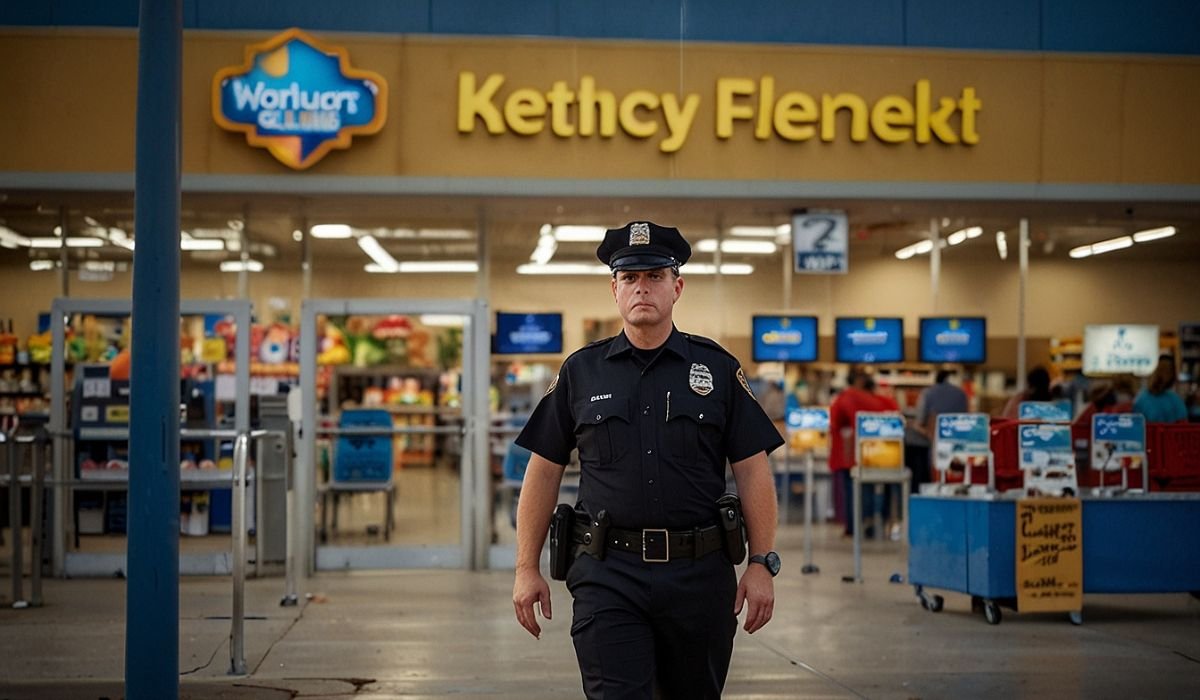Did you know that Walmart, America’s largest retailer, often has a police presence rivaling small town stations? It’s a reality many Kentuckians encounter during routine shopping trips. The sight of uniformed officers inside or frequently visiting your local Walmart isn’t random – it’s a calculated response to complex challenges facing big-box retail. Understanding the “Kentucky Walmart police presence” goes beyond spotting a cop; it’s about grasping the reasons, impacts, and ongoing debates surrounding this visible layer of security in the Bluegrass State. We are going to explore it in detail.
Walmart stores, by their very nature – vast spaces, high foot traffic, valuable merchandise – are inherently challenging to secure. While the company employs its own asset protection teams and security personnel, these teams have limited authority. They can observe, deter, and detain individuals suspected of theft only until law enforcement arrives. This is where local police departments become crucial partners.
Several key factors contribute to the noticeable police presence at many Kentucky Walmart locations:
- High Volume of Calls for Service: Walmart locations consistently generate a significant number of calls to 911 and local police non-emergency lines. These calls range dramatically in severity:
- Shoplifting & Retail Theft: This is often the most frequent reason. Organized Retail Crime (ORC) rings specifically target big-box stores.
- Disturbances & Altercations: Disputes between customers, unruly behavior, or incidents involving distressed individuals.
- Medical Emergencies: Falls, heart attacks, or other health crises occurring within the store.
- Fraud: Bad checks, credit card scams, or return fraud.
- Violent Crimes: Though less frequent than theft, assaults, robberies, and even shootings have occurred, tragically, at some Walmart locations nationwide, including in Kentucky.
- Trespassing & Loitering: Enforcing bans on individuals previously caught stealing or causing disturbances.
- Lost Children: A common and urgent call requiring immediate police response.
- Proactive Patrols & Deterrence: Many police departments, especially in areas experiencing higher crime rates or with specific stores known for frequent issues, deploy officers to patrol Walmart parking lots and occasionally walk the aisles. The visible presence aims to:
- Deter potential shoplifters and criminals.
- Provide a rapid response if an incident occurs.
- Reassure shoppers and employees.
- Formal Store Assignments & Contracts: In some municipalities facing extreme challenges, police departments have experimented with, or formally established, dedicated officer assignments within specific Walmart stores. Sometimes, this involves off-duty officers working paid security details funded by Walmart. This creates a near-constant police presence.
- Resource Allocation & “Hot Spots”: Police departments analyze crime data. Stores generating disproportionate calls naturally become “hot spots,” drawing more police attention and resources simply because that’s where a significant portion of community incidents are happening.
The Kentucky Walmart police presence generates mixed reactions and has tangible effects:
- Potential Benefits:
- Increased Perceived Safety: Many shoppers and employees report feeling safer seeing an officer nearby.
- Faster Response Times: Having officers on-site or frequently patrolling can drastically reduce response times for serious incidents.
- Deterrence: Visible presence can discourage opportunistic crime.
- Support for Store Staff: Officers can handle situations beyond the scope of store security, protecting employees.
- Common Concerns & Criticisms:
- Over-Policing & Bias: Critics argue that constant police presence can lead to disproportionate scrutiny, particularly of minorities or low-income shoppers, potentially escalating minor situations unnecessarily. Concerns about racial profiling are significant.
- Strain on Public Resources: When large amounts of police time are consumed by calls from a single private business, it raises questions about the appropriate use of taxpayer-funded resources. Is it fair that other areas of the community receive less patrol coverage?
- Criminalizing Poverty/Minor Offenses: Some worry that aggressive policing for minor shoplifting, often driven by poverty or addiction, funnels people into the justice system instead of addressing root causes.
- Atmosphere of Distrust: A heavy police presence can make some shoppers feel unwelcome or anxious, rather than safe.
- The Walmart Burden Debate: This is a nationwide discussion acutely felt in Kentucky. Municipalities sometimes push back, arguing that Walmart’s business model and security choices create a disproportionate burden on local police forces. Negotiations over cost-sharing for dedicated officers or other security solutions are not uncommon.
It’s important to understand your rights and the law regarding police in a retail setting:
- Private Property, Public Police: While Walmart is private property, police officers have the same authority there as on public streets if they are there in their official capacity (on-duty or working an approved off-duty detail).
- Detention by Store Security: Walmart security can detain you if they have probable cause to believe you committed theft (shoplifting). This is a “citizen’s arrest.” They must turn you over to law enforcement promptly. You have the right to remain silent.
- Interactions with Police:
- You have the right to remain silent. Clearly state, “I am choosing to remain silent.” Avoid arguing.
- You have the right to refuse searches of your person or belongings unless the officer has a warrant or probable cause. Say, “I do not consent to a search.”
- Ask if you are free to leave. If yes, you can walk away.
- Be calm and respectful, even if you believe the interaction is unjustified. Escalating helps no one.
- Recording: In Kentucky, you generally have the right to record police officers in public spaces, including inside Walmart, as long as you are not interfering with their duties.
The trend isn’t disappearing, but its form is evolving:
- Increased Technology: Walmart is investing heavily in AI-powered cameras, license plate readers in parking lots, and self-checkout monitoring. This aims to prevent incidents before they require police, potentially reducing some calls.
- Focused Partnerships: Discussions continue between Walmart, police departments, and local governments about more sustainable models. This might involve targeted patrols, better data sharing, or exploring alternative security solutions funded by Walmart.
- Community Pressure: Advocacy groups continue to push for reforms, demanding Walmart invest more in social services, employee training, and loss prevention strategies that don’t rely solely on police, and for police departments to address bias concerns.
- Legislative Action: States and municipalities might explore legislation governing the use of public police resources for private security at large retailers.
- It’s Driven by Volume: The Kentucky Walmart police presence is primarily a response to the sheer number and variety of incidents occurring at these high-traffic locations.
- It’s a Double-Edged Sword: While aiming to increase safety, it raises valid concerns about resource allocation, bias, and community impact.
- Know Your Rights: Understand what store security and police can and cannot do during a detention or interaction.
- Stay Observant & Calm: If you see an incident, avoid getting involved unless absolutely necessary. Report concerns to store management or appropriate oversight bodies.
- Engage in the Conversation: This is an ongoing community issue. Attend local council meetings, contact your representatives, and voice your perspective on how public safety resources are used and how businesses like Walmart should contribute to community security.
What’s your experience with police presence at your local Kentucky Walmart? Does it make you feel safer, or raise concerns? Share your thoughts below.
- Q: Why are there always police at my Walmart in Kentucky?
A: High call volumes (theft, disturbances, medical issues), proactive patrols to deter crime, and sometimes formal security contracts or dedicated officer assignments lead to frequent police visibility. - Q: Is Walmart paying for these police officers?
A: Sometimes. Police may patrol as part of regular duties. However, dedicated officers inside the store are often off-duty officers paid directly by Walmart through a security contract with the police department. - Q: Can Walmart security arrest me?
A: They can detain you (citizen’s arrest) if they have probable cause for shoplifting, but must turn you over to law enforcement promptly. Only actual police officers can make a formal arrest. - Q: Do I have to answer questions from police or Walmart security in the store?
A: No. You have the right to remain silent. You can politely state, “I am choosing to remain silent.” You also have the right to refuse searches without a warrant or probable cause. - Q: Is the police presence at Walmart a sign it’s unsafe?
A: Not necessarily. High traffic alone generates incidents. Police may be there proactively to prevent crime and ensure rapid response, not just because crime is rampant. However, frequent serious incidents are a concern. - Q: Are people unfairly targeted by police in Walmarts?
A: This is a major concern raised by critics and community groups. Allegations of racial profiling or disproportionate scrutiny of certain demographics highlight the need for oversight and training. - Q: What is Walmart doing to reduce the need for police?
A: They are investing in technology (AI cameras, license plate readers), locking up more high-theft items, and exploring other security measures. The effectiveness in reducing police calls is still evolving.

